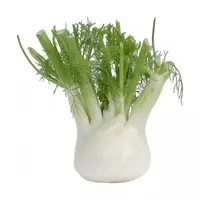Fennel

The history of this wonderful plant is quite long, since the bulb, flowers, seeds, pinnate leaves and stems of fennel began to be used by the ancient Romans, as well as the cooks of Ancient Egypt, China and India. The culinary merits and properties of fennel are varied. For example, dried seeds can be used as a seasoning, and leaves with their aroma and original appearance can decorate any dish. By the way, many are often mistaken, claiming that fennel is one of the names of dill. Despite their outward resemblance and similar aroma, they are different plants.
Recently, fennel has been in high demand and is especially popular in the field of gastronomy. The marten of this plant can be prepared in a variety of ways, such as putting out or baking, and then serving to pasta or meat as a side dish. Among foodies, the combination of white fish with this spicy plant is especially popular. It is quite interesting to use fennel with ginger when baking fish and meat, or you can brew unusual fennel tea by adding a pinch of ginger to it. It is known that fennel fruits have about 15% fatty oil in their composition, which often acts as a substitute for cocoa butter. But fennel grass helps hostesses with salting and pickling products, while it is used as a flavoring agent.
When buying fennel fruits, special attention should be paid to their appearance: they should be dense, light green or white, and fresh in smell, with anise notes. The shelf life of fennel is not particularly long - a maximum of five days, and even then in the refrigerator. Keep in mind that the aroma of this plant disappears every day, so do not really delay preparing dishes that include fennel.
Benefits of fennel
It is believed that fennel juice has an unusually strong effect on vision, namely, it reduces the feeling of irritation and fatigue of the eyes. In addition, traditional medicine claims the benefit of fennel in the treatment of cataracts and conjunctivitis. This natural medicine has a lot of useful properties: starting with antispasmodic and aromatic and ending with diuretic and exhilarating.
This healthy herb helps improve appetite and relieves colic and abdominal cramps. With regular use, the benefits of fennel can affect the improvement of the condition of internal organs, as it has the ability to cleanse the liver, gallbladder and spleen.
Harm to fennel
The harm of fennel is expressed not only in the personal intolerance of the product. Due to the fact that this plant has an antispasmodic effect, doctors strongly discourage its use to epileptics and pregnant women.
fennel 31 kCal
Energy value of fennel (Ratio of proteins, fats, carbohydrates - ju):
Proteins: 1.24 g (~ 5 kCal)
Fats: 0.2 g (~ 2 kCal)
Carbohydrates: 7.29 g (~ 29 kCal)
Energy ratio (b | y): 16% | 6% | 94%
 Español
Español Français
Français Português
Português Русский
Русский 简体中文
简体中文 繁體中文
繁體中文 日本語
日本語 한국어
한국어 العربية
العربية Türkçe
Türkçe Қазақ
Қазақ Deutsch
Deutsch Italiano
Italiano Українська
Українська
